一般将来时和过去将来时
一般将来时过去将来时ppt课件

经常与一般将来时连用的时间状语 tomorrow, the day after tomorrow, next day (week, month, year…),soon, in the future, from now on, before long, in a few minutes, in two years.
为深入学习习近平新时代中国特色社 会主义 思想和 党的十 九大精 神,贯彻 全国教 育大会 精神,充 分发挥 中小学 图书室 育人功 能
was /were about to do … when… 正要…(突然发生)…
I was about to start off when the phone rang. 我正要出发,电话响了。
为深入学习习近平新时代中国特色社 会主义 思想和 党的十 九大精 神,贯彻 全国教 育大会 精神,充 分发挥 中小学 图书室 育人功 能
go, come, leave, start, arrive, stay, fly, land,
take off等动词可用过去进行时表示过去将来。 He said he was coming for dinner. 他说他要来吃晚饭。
She was packing.
过去的打算
She was going on a trip.
为深入学习习近平新时代中国特色社 会主义 思想和 党的十 九大精 神,贯彻 全国教 育大会 精神,充 分发挥 中小学 图书室 育人功 能
My friend told me __e_v_e__r_y_t_h_i_n__g__w__o_u__ld__b__e__f_in__e___.
一般将来时与过去将来时
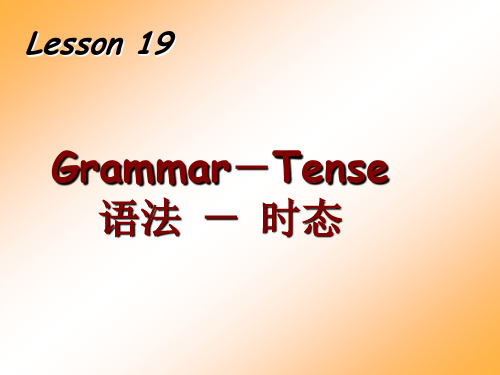
2. be going to do 的含义
be going to do 用于表示计划、打算去做某事(强 调主观意愿);还可以表示根据事实情况,有 迹象极有可能发生的事。如:
示将要发生的动作。
e.g. • I’m coming. (我就来了。) • Are we all going ? (我们都将去吗?)
4. “主将从现”原则
在含有条件状语从句或时间状语从句的复
合句中,从句用一般现在时,主句用将 来时,且用will而不用be going to。如:
• Mum will go to Beijing if(如果) it doesn’t rain tomorrow.
• When(当…的时候) you get home, you’ll find a new bike in your garden.
5. 表示将来时的其他词组
1. be +to不定式表将来,按计划或正式安排将 发生的事。
e.g. We are to discuss the report next Saturday. 我们下星期六讨论这份报告。
We didn’t know whether they were going to give us a talk this afternoon. I didn’t know when he would leave for Shanghai.
2. 过去将来时常用于间接引语中
He said he would come back the next day. He told me that he would go back soon.
动词与时态三10(一般将来和过去将来时)

一般将来时定义:一般将来时表示将来某个时间将要发生的动作或存在的状态,也表示将来经常或反复发生的动作。
常见时间标志词:tomorrow,tomorrow morning (afternoon,evening),next +时间(next night,next Monday …,next week,month…,next summer…,next year),in (the)future (将来),soon (不久之后),in +时间(in five days——再过五天,in two weeks——再过二星期),etc.基本结构:①主语+be going to + do;②主语+will+ do.③主语(只能为I /We)+shall+do否定句:在①be动词(am, is, are)后加not;②will后加not成won’t;③shall后加not成shan’t一般将来时的构成1.(I):主语+shall/will+其他..肯(否)定句的构成:主语+ Will(not)+动词原形+其他E.g; You will feel better after this medicne.( 表示预见)They will/won't go shopping this afternoon.We shall/shan't be there before dark.疑问句的构成:Will+主语+动词原形+其他?E.g:Will they go shopping this afternoon?Shall we go to the park?回答方式:Yes,主语+will. No 主语+won’t备注:无论主语是第几人称,都可以will,但是shall后只能用在第一人称I ,We后面E.g:I shall (will) learn English next year.Shall we walk to school tomorrow?-----Yes,we shall. No,we shall not2.(II):主语+be going to +…(表示即将发生的或最近打算进行的事)肯(否)定句的构成:主语+be (not) going to +..E.g:We are going to have a picnic this weekend.I t is going to rain.疑问句:Be+主语+going to +动词原形+。
时态:一般将来过去将来
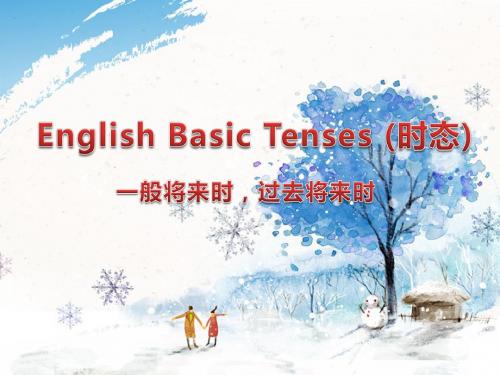
一般将来时
She will not take a plane any more. 她不再乘坐飞机。
11
过去将来时
She said she would not take a plane any more.
她说她不再乘坐飞机。
12
一般将来时
She is going to swim with Mom this afternoon.
23
明天我去圆明园玩。
I ’ m going to visit YUANMINGYUAN tomorrow.
24
今儿下午将下雨。
It’s going to rain this afternoon.
25
老师告诉我,下个月我军训。
My teacher told me I would have military training the next month.
一般将来时: The Simple Future Tense 表示将来要发生的或经常反复发生的动作或存在的状态及打算计划做某事。 过去将来时: The Simple Past Future Tense
表示过去某一时间来看将要发生的动作或存在状态,
常用于间接英语和宾语从句。
2
“下周我们返校”怎么说?
一般将来时
We will return to our school next week.
They said they would return their school the next week.
搭配时间及样例 将来时间状语如 tomorrow, next week, in 2012, in +一段时间
7
判断句子中的时态
Judgment sentence tenses
掌握时态一般将来时和过去将来时

掌握时态一般将来时和过去将来时一般将来时和过去将来时是英语中常用的两种时态形式,它们帮助我们描述将来发生的动作或事件,同时强调时间的关系。
在本文中,我们将重点探讨这两种时态的用法和相应的例句。
一、一般将来时(Simple Future Tense)一般将来时用来表达将来某个时间发生的动作或事件。
我们可以使用以下几种结构来构成一般将来时:1. 使用“will + 动词原形”构成句子,表示决定或预测的未来动作或事件。
例如:- I will visit my grandparents this weekend.(我会在这个周末去拜访我的祖父母。
)- He will be a doctor when he grows up.(他长大后会成为一名医生。
)2. 使用“be going to + 动词原形”表示计划、意愿或打算去做某事。
例如:- I am going to study abroad next year.(明年我打算出国留学。
)- She is going to have a party on Friday.(她打算在周五举办一个派对。
)3. 使用“shall + 动词原形”构成句子,表示“我将”,主要用于“我们”(“we”)和“我”(“I”)。
例如:- We shall meet at the park tomorrow.(明天我们将在公园见面。
)- Shall I help you with the bags?(我应该帮你拿行李吗?)二、过去将来时(Future in the Past Tense)过去将来时用于描述在过去某个时间点将来会发生的动作或事件。
我们可以使用以下结构来构成过去将来时:1. 使用“would + 动词原形”构成句子,表示过去某个时间点的将来动作。
例如:- He said he would come to the party.(他说他会来参加派对。
)- She told me she would give me a call later.(她告诉我她稍后会给我打电话。
一般将来时与过去将来时知识点总结

一般将来时与过去将来时知识点总结一般将来时(Future Simple Tense)是指表示将来一些时间发生的动作或状态。
在英语中,一般将来时的构成使用助动词“will”或者“shall”加动词的原形。
以下是一般将来时的一些重要知识点总结。
1. 构成:一般将来时的基本结构是“will/shall + 动词原形”。
例如:I will go to the party tonight.(我今晚要去参加派对。
)3. 疑问形式:在一般将来时的疑问形式中,将助动词“will”或者“shall”放到句首。
例如:Will you help me with my homework?(你会帮我做作业吗?)4.用法:- 表示将来时间的动作或事件:I will visit my grandparentsnext weekend.(我下周末会去看望我的祖父母。
)- 表示打算或意愿:He will help you with the project.(他愿意帮助你完成这个项目。
)- 表示预测或推测:I think it will rain tomorrow.(我认为明天会下雨。
)5. 时间状语:一般将来时通常与一些表示将来时间的时间状语连用,例如:tomorrow(明天)、next week(下星期)、soon(很快)等。
过去将来时(Future in the Past)是指在过去一些时刻认为将来一些时间会发生的动作或状态。
主要用于叙述过去的故事或描述过去的情况。
以下是过去将来时的一些重要知识点总结。
2. 否定形式:在过去将来时的否定形式中,将助动词“would”或者“should”和动词原形之间加上“not”。
例如:She said she wouldnot be able to attend the meeting.(她说她不能去参加会议。
)3. 疑问形式:在过去将来时的疑问形式中,将助动词“would”或者“should”放到句首。
一般将来时和过去将来时

一般将来时的构成和用法◆一般将来时主要有以下几种表现形式由助动词shall或will加动词原形构成,shall 用于第一人称,will用于第二、三人称。
除英国外的说英语的国家,在陈述句中,即使在第一人称一般也用will,在英国也有这种趋势。
在口语中,常用shall, will的缩写形式为’ll, 如:I’ll, you’ll等。
Shall not的缩写式为:shan’t, will not 的缩写式为:won’t.肯定句:I/We shall/will go.You/He/She/They will go.否定句:I/We shall/will not go.You/He/She/They will not go.疑问句:Shall I/we go?Will you/he/she/they go?◆一般将来时用法(1)一般将来时表示将要发生的动作或情况。
例如:I will(shall) arrive tomorrow.我明天到。
Will you be free tonight? 你今晚有空吗?We won’t (shan’t) be busy this evening. 我们今晚不忙。
(2)在一般将来时的句子中,有时有表示将来时间的状语,有时没有时间状语,这时要从意思上判断是否指未来的动作或情况。
例如:Will she come? 她(会)来吗?We’ll only stay for two weeks. 我们只待两星期。
The meeting won’t last long. 会开不了多久。
(3)在以第一人称I或we作主语的问句中,一般使用助动词shall,这时或是征求对方的意见(a),或是询问一个情况(b):a. Where shall we meet? 我们在哪儿碰头?b. Shall we have any classes tomorrow?明天我们有课吗?在这类问句中,近年来也有不少人用will,特别是在美国。
一般将来时与过去将来时知识点总结
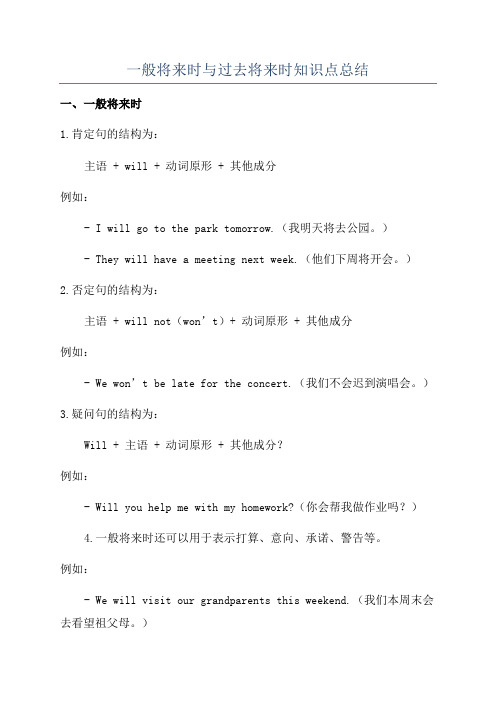
一般将来时与过去将来时知识点总结一、一般将来时1.肯定句的结构为:主语 + will + 动词原形 + 其他成分例如:- I will go to the park tomorrow.(我明天将去公园。
)- They will have a meeting next week.(他们下周将开会。
)2.否定句的结构为:主语 + will not(won’t)+ 动词原形 + 其他成分例如:- We won’t be late for the concert.(我们不会迟到演唱会。
)3.疑问句的结构为:Will + 主语 + 动词原形 + 其他成分?例如:- Will you help me with my homework?(你会帮我做作业吗?)4.一般将来时还可以用于表示打算、意向、承诺、警告等。
例如:- We will visit our grandparents this weekend.(我们本周末会去看望祖父母。
)- He will work hard to pass the exam.(他会努力学习以通过考试。
)- I won’t accept the j ob offer.(我不会接受这个工作机会。
)5.当表示将来的时间或条件时,可以使用其他时间状语或条件从句来修饰。
例如:二、过去将来时过去将来时用于表示过去一些时间将要发生的动作或状态,一般由助动词"would"或"should"加上动词的原形构成。
1.肯定句的结构为:主语 + would / should + 动词原形 + 其他成分例如:- She said she would meet me at the airport yesterday.(她说她昨天会在机场接我。
)- They knew they should finish their homework before going out.(他们知道他们应该在出去之前完成作业。
最新一般将来时和过去将来时的用法
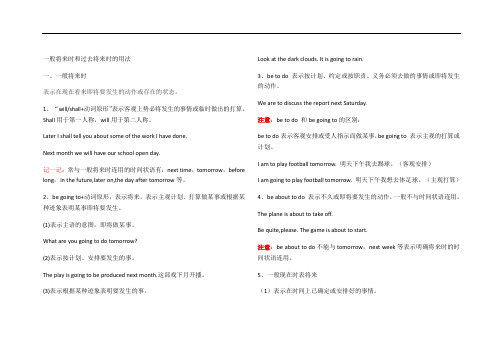
一般将来时和过去将来时的用法一、一般将来时表示在现在看来即将要发生的动作或存在的状态。
1、“will/shall+动词原形”表示客观上势必将发生的事情或临时做出的打算。
Shall用于第一人称,will用于第二人称。
Later I shall tell you about some of the work I have done.Next month we will have our school open day.记一记:常与一般将来时连用的时间状语有:next time,tomorrow,before long,in the future,later on,the day after tomorrow等。
2、be going to+动词原形,表示将来。
表示主观计划、打算做某事或根据某种迹象表明某事即将要发生。
(1)表示主语的意图,即将做某事。
What are you going to do tomorrow?(2)表示按计划、安排要发生的事。
The play is going to be produced next month.这部戏下月开播。
(3)表示根据某种迹象表明要发生的事。
Look at the dark clouds. It is going to rain.3、be to do 表示按计划、约定或按职责、义务必须去做的事情或即将发生的动作。
We are to discuss the report next Saturday.注意:be to do 和be going to的区别:be to do表示客观安排或受人指示而做某事,be going to 表示主观的打算或计划。
I am to play football tomorrow. 明天下午我去踢球。
(客观安排)I am going to play football tomorrow. 明天下午我想去体足球。
(主观打算)4、be about to do 表示不久或即将要发生的动作,一般不与时间状语连用。
一般将来时与过去将来时的用法比较初中知识点总结
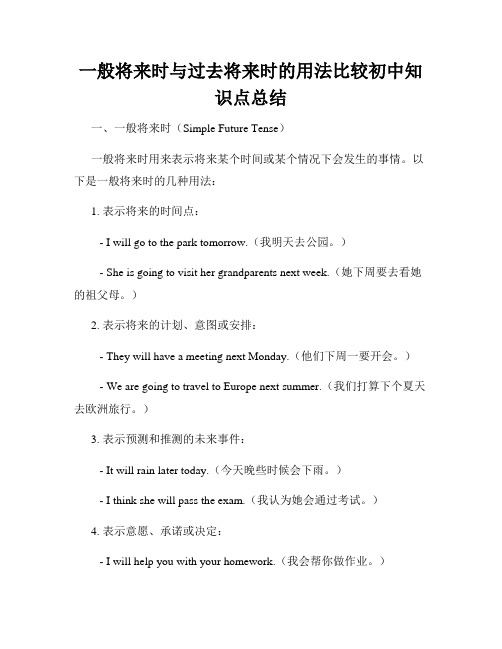
一般将来时与过去将来时的用法比较初中知识点总结一、一般将来时(Simple Future Tense)一般将来时用来表示将来某个时间或某个情况下会发生的事情。
以下是一般将来时的几种用法:1. 表示将来的时间点:- I will go to the park tomorrow.(我明天去公园。
)- She is going to visit her grandparents next week.(她下周要去看她的祖父母。
)2. 表示将来的计划、意图或安排:- They will have a meeting next Monday.(他们下周一要开会。
) - We are going to travel to Europe next summer.(我们打算下个夏天去欧洲旅行。
)3. 表示预测和推测的未来事件:- It will rain later today.(今天晚些时候会下雨。
)- I think she will pass the exam.(我认为她会通过考试。
)4. 表示意愿、承诺或决定:- I will help you with your homework.(我会帮你做作业。
)- He won't be late for the meeting.(他不会迟到开会。
)5. 表示习惯性的将来行为:- My dad usually goes for a run every morning.(我爸爸通常每天早上去跑步。
)- I always eat breakfast before leaving for school.(我出门上学之前总是吃早餐。
)二、过去将来时(Future in the Past)过去将来时用来表示在过去某个时间点认为将来会发生的事情。
以下是过去将来时的几种用法:1. 表示过去某个时间点的将来:- He said he would clean the house the next day.(他说他第二天要打扫房子。
过去将来时与一般将来时的比较与区别

过去将来时与一般将来时的比较与区别(最新版)编制人:__________________审核人:__________________审批人:__________________编制单位:__________________编制时间:____年____月____日序言下载提示:该文档是本店铺精心编制而成的,希望大家下载后,能够帮助大家解决实际问题。
文档下载后可定制修改,请根据实际需要进行调整和使用,谢谢!并且,本店铺为大家提供各种类型的经典范文,如词性大全、句法大全、句型大全、从句大全、时态大全、语态大全、语法大全、虚拟语气、用法辨析、其他资料等等,想了解不同范文格式和写法,敬请关注!Download tips: This document is carefully compiled by this editor.I hope that after you download it, it can help you solve practical problems. The document can be customized and modified after downloading, please adjust and use it according to actual needs, thank you!In addition, this shop provides you with various types of classic sample essays, such as part of speech, syntax, sentence pattern, clause, tense, voice, grammar, subjunctive, usage analysis, other materials, etc. If you want to know the different formats and writing methods of the model essay, please pay attention!过去将来时与一般将来时的比较与区别一般将来时是表示从现在看来将要发生的情况,而过去将来时则是表示从过去看来将要发生的情况,所以从理论上说,只要把“考察”的时间从现在移到过去,那么一般将来时的用法就变成了过去将来时的用法。
语法中的一般将来时与过去将来时

语法中的一般将来时与过去将来时一般将来时与过去将来时是英语语法中的两个重要时态。
它们用来描述将来发生或已经发生的动作、事件或情况。
本文将介绍一般将来时与过去将来时的概念、用法以及相关例句。
一、一般将来时一般将来时(Simple Future Tense)用于表示将来某个时间或条件下将要发生的动作、事件或情况。
一般将来时的构成如下:1. 肯定句:主语 + will + 动词原形2. 否定句:主语 + will not + 动词原形3. 疑问句:Will + 主语 + 动词原形?例如:1. I will buy a new car next month.(我下个月将买一辆新车。
)2. They will not attend the party tonight.(他们今晚不会参加聚会。
)3. Will you join us for dinner tomorrow?(你明天会和我们一起吃饭吗?)二、过去将来时过去将来时(Future in the Past)用于表示过去某个时间或条件下本来将要发生的动作、事件或情况,但实际并未发生。
过去将来时的构成如下:1. 肯定句:主语 + would + 动词原形2. 否定句:主语 + would not + 动词原形3. 疑问句:Would + 主语 + 动词原形?例如:1. He said he would help me with my homework.(他说他会帮我做作业。
)2. We knew she would not be able to come.(我们知道她将不能来。
)3. Would you like some coffee?(你想要一些咖啡吗?)三、一般将来时与过去将来时的区别一般将来时与过去将来时之间存在一些区别。
一般将来时用于表示将来的情况,而过去将来时用于表示过去的将来情况。
一般将来时使用will,而过去将来时使用would。
例如:1. I will visit my grandparents tomorrow. (一般将来时)(我明天要去看望我的祖父母。
一般将来时与过去将来时知识点总结

一般将来时与过去将来时知识点总结一、一般将来时(Simple Future Tense):1. 构成:将来时的一般肯定句由“助动词will + 动词原形”构成,即主语 + will + 动词原形。
2. 否定形式:在助动词will后面加上not,即will not 或won't。
3. 疑问形式:将助动词will提前到句首,即will + 主语 + 动词原形。
4.使用场景:a.表示对未来的预测、判断或意愿。
b.表示承诺、决心或意愿。
c.表示请求、邀请或建议。
d.表示命令或指示。
5.注意事项:a. 不要将will和shall混淆使用,shall一般只用于第一人称(I和we)的疑问句和建议句中。
b. 有时可以使用be going to + 动词原形来表示将来时,特别是当我们对未来发生的事情有较强的信心或根据已有的证据得出结论时。
二、过去将来时(Future in the Past Tense):1. 构成:过去将来时的构成由“助动词would + 动词原形”或“was/were going to + 动词原形”构成。
2.使用场景:a.表示对过去事情发生的预测、计划或意愿。
b.表示对过去人对未来发生的动作、事件或情况的预测或假设。
3.注意事项:a.过去将来时一般只用于过去发生的陈述句、疑问句和条件句中。
b.过去将来时不会出现在与现在相关的时间状语从句中,而是与过去相关的时间状语从句中。
例如:1. I will go to the party tomorrow evening.(我明天晚上要去参加派对。
)2. He won't be there next week.(下周他不会在那里。
)3. Will you help me with my homework?(你会帮我做作业吗?)4. The teacher will explain the lesson tomorrow.(老师明天会解释这课。
英语语法:一般将来时与过去将来时概述

⼀般将来来和过去将来 ⼀般将来时构成如下: 肯定式疑问式否定式疑问否定式 I shall work Shall i work? I shall not work Shall i not work? He(she,it) Will he He(she,it)will Will he (she,it) will work (she,it)work? not work. not work? We shall work Shall we work? We shall not work Shall we not work? You will work Will you work? You will not work Will you not work? They will work Will they work? They will not work Will they not work? 其结构有如下⼏种: 1)will + 动词原形(will可以⽤于任何⼈称) 需要注意的是当主语是第⼀⼈称时will可以换成shall,特别是在以I或we作主语的问句中,⼀般⽤shall. e.g. Shall we go to the zoo? 2)be going to +动词原形 3)现在进⾏时也可表⽰将来,前边已经讲过,这⾥不在重复. 第⼀种结构的句式变化是: 变否定句在will后边加not. 变⼀般疑问句把will提前. e.g. She will be back in three days. She will not be back in three days. Will She be back in three days? 第⼆种结构的句式变化要在be上做⽂章. E.g. They are going to clean their classroom. They are not going to clean their classroom. Are they going to clean their classroom? 其时间状语有如下⼏种 1)this引导的短语如 this year 2)tomorrow及其相关短语如tomorrow morning 3)next引导的短语如next month 4) from now on ; in the future ; in an hour 等。
高一英语语法(2-3):动词的时态之一般将来时、过去将来时和将来完成时
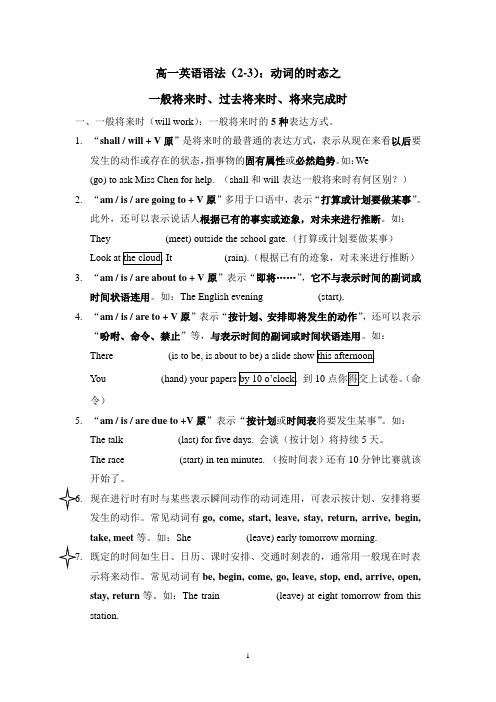
高一英语语法(2-3):动词的时态之一般将来时、过去将来时、将来完成时一、一般将来时(will work):一般将来时的5种表达方式。
1.“shall / will + V原”是将来时的最普通的表达方式,表示从现在来看以后要发生的动作或存在的状态,指事物的固有属性或必然趋势。
如:We __________ (go) to ask Miss Chen for help. (shall和will表达一般将来时有何区别?)2.“am / is / are going to + V原”多用于口语中,表示“打算或计划要做某事”。
此外,还可以表示说话人根据已有的事实或迹象,对未来进行推断。
如:They __________ (meet) outside the school gate.(打算或计划要做某事)(根据已有的迹象,对未来进行推断)3.“am / is / are about to + V原”表示“即将……”,它不与表示时间的副词或时间状语连用。
如:The English evening __________ (start).4.“am / is / are to + V原”表示“按计划、安排即将发生的动作”,还可以表示“吩咐、命令、禁止”等,与表示时间的副词或时间状语连用。
如:到10(命令)5.“am / is / are due to +V原”表示“按计划或时间表将要发生某事”。
如:The talk __________ (last) for five days. 会谈(按计划)将持续5天。
The race __________ (start) in ten minutes. (按时间表)还有10分钟比赛就该开始了。
现在进行时有时与某些表示瞬间动作的动词连用,可表示按计划、安排将要发生的动作。
常见动词有go, come, start, leave, stay, return, arrive, begin, take, meet等。
- 1、下载文档前请自行甄别文档内容的完整性,平台不提供额外的编辑、内容补充、找答案等附加服务。
- 2、"仅部分预览"的文档,不可在线预览部分如存在完整性等问题,可反馈申请退款(可完整预览的文档不适用该条件!)。
- 3、如文档侵犯您的权益,请联系客服反馈,我们会尽快为您处理(人工客服工作时间:9:00-18:30)。
.一般将来时的构成和用法◆一般将来时主要有以下几种表现形式由助动词shall或will加动词原形构成,shall 用于第一人称,will用于第二、三人称。
除英国外的说英语的国家,在陈述句中,即使在第一人称一般也用will,在英国也有这种趋势。
在口语中,常用shall, will的缩写形式为’ll, 如:I’ll, you’ll等。
Shall not的缩写式为:shan’t, will not 的缩写式为:won’t.肯定句:I/We shall/will go.You/He/She/They will go.否定句:I/We shall/will not go.You/He/She/They will not go.疑问句:Shall I/we go?Will you/he/she/they go?◆一般将来时用法(1)一般将来时表示将要发生的动作或情况。
例如:I will(shall) arrive tomorrow.我明天到。
Will you be free tonight? 你今晚有空吗?We won’t (shan’t) be busy this evening. 我们今晚不忙。
(2)在一般将来时的句子中,有时有表示将来时间的状语,有时没有时间状语,这时要从意思上判断是否指未来的动作或情况。
例如:Will she come? 她(会)来吗?We’ll only stay for two weeks. 我们只待两星期。
The meeting won’t last long. 会开不了多久。
(3)在以第一人称I或we作主语的问句中,一般使用助动词shall,这时或是征求对方的意见(a),或是询问一个情况(b):a. Where shall we meet? 我们在哪儿碰头?b. Shall we have any classes tomorrow?明天我们有课吗?在这类问句中,近年来也有不少人用will,特别是在美国。
例如:How will I get there? 我怎么去?(4)be going to+动词原形a.表示打算、准备做的事。
例如:We are going to put up a building here.我们打算在这里盖一座楼。
How are you going to spend your holidays?假期你准备怎样过?b.表示即将发生或肯定要发生的事。
例如:I think it is going to snow. 我看要下雪了。
There’s going to be a lot of trouble about this. 这事肯定会有很多麻烦。
c.“will”句型与“be going to”句型,前者表示纯粹将来,后者表示打算、计划、准备做的事情,更强调主语的主观意愿。
例如:Tomorrow will be Saturday. 明天是周六了。
We are going to visit Paris this summer.今年夏天我们打算游览巴黎。
. Exercise 1( ) 1. There __________ a meeting tomorrow afternoon.A. will be going toB. will going to beC. is going to beD. will go to be( ) 2. Charlie ________ here next month.A. isn’t workingB. doesn’t workingC. isn’t going to workingD. won’t work( ) 3. He ________ very busy this week, he ________ free next week.A. will be; isB. is; isC. will be; will beD. is; will be( ) 4. There ________ a dolphin show in the zoo tomorrow evening.A. wasB. is going to haveC. will haveD. is going to be( ) 5. –________ you ________ free tomorrow?– No. I ________ free the day after tomorrow.A. Are; going to; willB. Are; going to be; willC. Are; going to; will beD. Are; going to be; will be( ) 6. Mother ________ me a nice present on my next birthday.A. will givesB. will giveC. givesD. give( ) 7. – Shall I buy a cup of tea for you?–________. (不,不要。
)A. No, you won’t.B. No, you aren’t.C. No, please don’t.D. No, please.( ) 8. – Where is the morning paper?– I ________ if for you at once.A. getB. am gettingC. to getD. will get( ) 9. ________ a concert next Saturday?A. There will beB. Will there beC. There can beD. There are( ) 10. If they come, we ________ a meeting.A. haveB. will haveC. hadD. would haveExercise 21. I ______(leave)in a minute. I ______(finish)all my work before I ______ (leave).2. —How long _____ you _____(study)in our country?—I _____(plan)to be here for about one more year.—I _____(hope)to visit the other parts of your country.—What ______ you ______(do)after you ______(leave)here?—I ______(return)home and ______(get)a job.3. I ______(be)tired. I ______(go)to bed early tonight.4. Mary’s birthday is next Monday, her mother _____(give)her a present.过去将来时的构成和用法过去将来时由“助动词would/should+动词原形”构成,表示从过去的某一时间来看将来要发生的动作或存在的状态。
过去将来时常用于宾语从句和间接引语中。
一、过去将来时的构成:过去将来时的构成和一般将来时的构成一样,只要把助动词will,shall变为过去式即可:1.过去将来时的肯定句。
句型:主语+would/should+动词原形+.......例:She was sixty-six. After three years she would be sixty-nine.(她66岁了。
3年后,她将69岁。
)He asked me if I would go abroad.(他问我是否会出国。
)2.过去将来时的否定句。
句型:主语+would/should+not+动词原形+........例:She told us that she would not go with us if it rained.(她告诉我们,如果下雨,她就不和我们一起去了。
)3.过去将来时的疑问句。
句型:Would/Should+主语+动词原形+…? 疑问词+would/should+主语+动词原形+....例:Would I dine with him? I thought about it before.(是否跟他一起吃饭呢?我之前考虑过这个问题。
)I didn’t know how to do it. What would be their ideas?(我不知如何去做。
他们会有什么想法呢?)二、过去将来时的基本用法。
1.表示过去习惯性的动作或状态。
例:I would play with him when I was a child.(当我还是孩童时,总是和他一起玩。
)2.用于间接引语及宾语从句中。
例:He said he would work for that boss the next year.(他说下一年他打算为那个老板工作了。
)Exercise 3 选择填空1. Li Ming said he _____happy if Brian_____to China next month.A. as; comeB. was; would comeC. would be; cameD. will be; come2. Jenny said she _____her holiday in China.A. spentB. would spentC. was going to spentD. would spend3. —What did your son say in the letter?—He told me that he ______ the Disney World the next day.A. will visitB. has visitedC. is going to visitD. would visit4. I hoped Tina ______ to my birthday party on time the next Wednesday.A. to comeB. is comingC. will comeD. was coming5. Father said that he ______ me to Beijing the next year.A. tookB. would takeC. takesD. will take6. We were not sure whether they ______ more vegetables.A. are going to growB. were going to growC. will growD. have grown7. She ______ to work when the telephone rang.A. is goingB. will goC. was about to goD. is to go8 The teacher ______ when I came into the classroom.A is drawingB drawsC has drawnD was drawing9 The pizza ______ by my mother. Would you like to have some?A makesB was makingC madeD was made10 Nobody noticed what she ______ at the moment.A will doB was doingC has doneD had done11 Was it raining hard when you _____ this morning?A leftB leavesC was leavingD would leaveExercise 4 用所给动词的适当形式填空1. Miss Zhang said she ________(visit) the Great Wall next summer.2. She told him that she ________(not stay) here for long.3. I wasn’t sure whether Lucy_______(come) the next year.4. The scientists said the world’s population _______ (slow) down in future.5. She said the bus _______(leave) at five the next morning.6. I wasn't sure whether he _______(lend) me his book the next morning.7. He was fifty-six. In two years he _______(be) fifty-eight.8. Whenever she has time, she ______(help) them in their work.。
